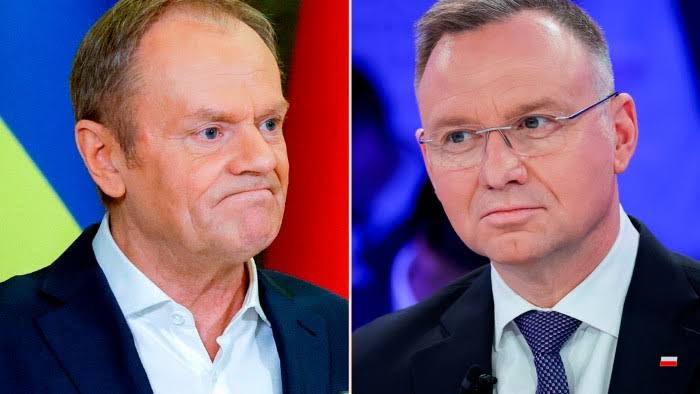
The Dispute Between The Polish President & Premier Over Air Defense Has Geopolitical Origins
Polish President Andrzej Duda and Prime Minister Donald Tusk are feuding over how best to defend their country’s skies, with the first preferring to retain the Anglo-American Axis (AAA) as Poland’s top partners while the second wants to join the German-led “European Sky Shield Initiative” (ESSI). Duda also described the ESSI as a “German business project” prior to Tusk declaring that Poland will join it with the intent of replicating Israel’s alleged air defense achievements. At the core of this dispute is geopolitics.
Duda is from the conservative-nationalist party that used to rule Poland prior to last fall’s elections while Tusk represents the liberal-globalist one that came back to power after then. The next presidential election won’t be until next year so the government is split between them till then. The conservative-nationalists envisage Poland leading the AAA-backed “Three Seas Initiative” (3SI) as a means of restoring its Great Power status while the liberal-globalists want to subordinate Poland to German hegemony.
These divergent geopolitical visions account for why these Polish leaders have polar opposite positions on this sensitive issue. The report hyperlinked to in the introduction reminded readers that “While Mr Duda oversees the armed forces, decisions about arms purchases are made by the government, which Mr Tusk leads, and cannot be blocked by the president.” This means that Tusk has the power to radically alter Polish defense policy if he wans to and Duda can’t do anything about it.
At the same time, however, the report also cited the head of the National Security Bureau who “told reporters that he did not think there was a big difference of opinion between the prime minister and president on air defence and that if existing projects are combined effectively with ESSI, with the participation of Polish industry, Mr Duda would support this.” For as pragmatic as that might sound, it’ll be difficult to pull off, both for operational and financial reasons.
It’s unrealistic to imagine that Poland would pull out of its previously agreed-upon Patriot deal with the US, hence why it’s assumed that Tusk’s government would still go through with it while also buying German and other systems as part of Poland’s participation in the ESSI
Regarding the first, it’s always easier for a country to operate an “ecosystem” of security products instead of a hodgepodge assembled from various sources, while the second pertains to what Duda said about how “We have been building an air defence system for years based primarily on the Patriot system, for the delivery of which we signed contracts a long time ago.” Purchasing German systems to pair with American ones would be confusing for servicemen and a waste of money just to make a point.
It’s unrealistic to imagine that Poland would pull out of its previously agreed-upon Patriot deal with the US, hence why it’s assumed that Tusk’s government would still go through with it while also buying German and other systems as part of Poland’s participation in the ESSI. These additional expenditures would virtue signal Poland’s “return to Europe” after what the liberal-globalists have spun as its prior “eight years of isolation” under their conservative-nationalist rivals.
In the event that the liberal-globalists perpetuate their rule over Poland, German and other non-American equipment could eventually replace US wares as the country becomes more dependent on Berlin. The geopolitical consequence would be that German hegemony over Poland would deepen, thus culminating in the EU’s de facto leader exploiting Poland as a vassal state whose function would be to “contain” Russia in Central & Eastern Europe as a permanently subordinated “junior partner’.
To be sure, Poland would play a similar role vis-à-vis Russia if it retained the AAA as its top air defense partners and hadn’t ever subordinated itself to German hegemony, but the difference is that it would be comparatively more autonomous on the European stage in the conservative-nationalists’ scenario. Under the liberal-globalists’ one, Poland is simply a neighboring appendage of Germany instead of providing faraway partners with irreplaceable strategic reach up to their Russian rivals’ doorstep.
This difference is more significant than it might seem to observers since the aspiring German hegemon takes Poland for granted and wants to subordinate it while the AAA appreciates the role that it plays for their grand strategy and therefore rewards it with comparatively more autonomy. Each set of relations is driven by the interests of Poland’s partners: Germany needs a Polish vassal state in order to become a superpower while the AAA needs an autonomous Poland to improvise with “containing” Russia.
Regardless of which geopolitical vision wins out, the fact of the matter is that Poland is destined to play a role in “containing” Russia, the goal of which is shared by both partisan camps but differs in terms of how it’s implemented and how much autonomy Poland preserves. No “third way” is politically viable since relevant parties remain unpopular as proven by the latest elections, and external influence is too deeply entrenched for Poland to extricate itself from, so a “patriotic solution” to this dilemma is unlikely.
______________________
Dr Andrew Korybko is a political analyst and a regular contributor to the Sixteenth Council Insights



